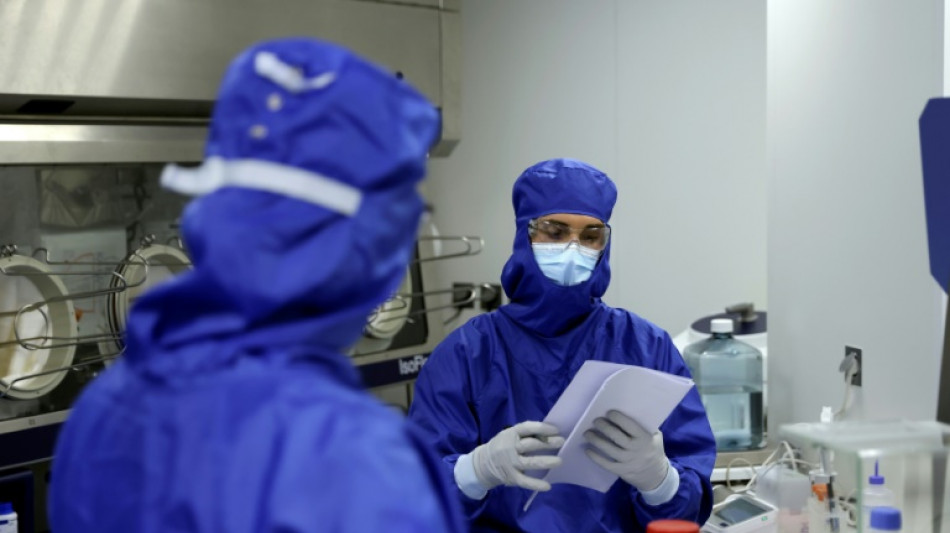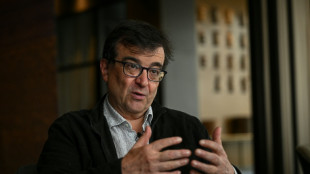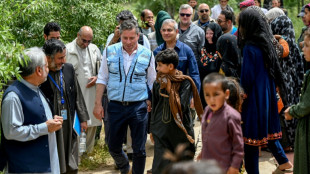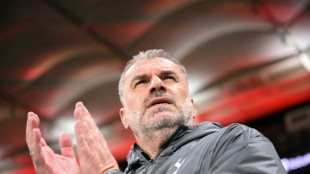
-
 Syria reports Israeli strikes as clashes with Druze spread
Syria reports Israeli strikes as clashes with Druze spread
-
Ukraine, US say minerals deal ready as suspense lingers

-
 Everything is fine: Trump's cabinet shrugs off shrinking economy
Everything is fine: Trump's cabinet shrugs off shrinking economy
-
Chelsea boss Maresca adamant money no guarantee of success

-
 Wood warns England cricketers against 'dumb' public comments
Wood warns England cricketers against 'dumb' public comments
-
US economy shrinks, Trump blames Biden

-
 Caterpillar so far not hiking prices to offset tariff hit
Caterpillar so far not hiking prices to offset tariff hit
-
Japan's Kawasaki down Ronaldo's Al Nassr to reach Asian Champions League final

-
 Trump praises Musk as chief disruptor eyes exit
Trump praises Musk as chief disruptor eyes exit
-
Chahal hat-trick helps Punjab eliminate Chennai from IPL playoff race

-
 Pope Francis saw clergy's lack of humility as a 'cancer': author
Pope Francis saw clergy's lack of humility as a 'cancer': author
-
Weinstein accuser recounts alleged rape at assault retrial in NY

-
 Piastri heads into Miami GP as the man to beat
Piastri heads into Miami GP as the man to beat
-
US economy unexpectedly shrinks in first quarter, Trump blames Biden

-
 Maxwell likely to miss rest of IPL with 'fractured finger'
Maxwell likely to miss rest of IPL with 'fractured finger'
-
Syria reports Israeli strikes after warning over Druze as sectarian clashes spread

-
 Despite war's end, Afghanistan remains deep in crisis: UN relief chief
Despite war's end, Afghanistan remains deep in crisis: UN relief chief
-
NFL fines Falcons and assistant coach over Sanders prank call

-
 British teen Brennan takes stage 1 of Tour de Romandie
British teen Brennan takes stage 1 of Tour de Romandie
-
Swedish reporter gets suspended term over Erdogan insult

-
 Renewable energy in the dock in Spain after blackout
Renewable energy in the dock in Spain after blackout
-
South Africa sets up inquiry into slow apartheid justice

-
 Stocks retreat as US GDP slumps rattles confidence
Stocks retreat as US GDP slumps rattles confidence
-
Migrants' dreams buried under rubble after deadly strike on Yemen centre

-
 Trump blames Biden's record after US economy shrinks
Trump blames Biden's record after US economy shrinks
-
UK scientists fear insect loss as car bug splats fall

-
 Mexico avoids recession despite tariff uncertainty
Mexico avoids recession despite tariff uncertainty
-
Rwandan awarded for saving grey crowned cranes

-
 Spurs have 'unbelievable opportunity' for European glory: Postecoglou
Spurs have 'unbelievable opportunity' for European glory: Postecoglou
-
Microsoft president urges fast 'resolution' of transatlantic trade tensions

-
 Poppies flourish at Tower of London for WWII anniversary
Poppies flourish at Tower of London for WWII anniversary
-
US economy unexpectedly shrinks on import surge before Trump tariffs

-
 Stocks drop after US economy contracts amid tariffs turmoil
Stocks drop after US economy contracts amid tariffs turmoil
-
US economy unexpectedly shrinks on import surge ahead of Trump tariffs

-
 Dravid says Suryavanshi, 14, needs support from fame
Dravid says Suryavanshi, 14, needs support from fame
-
Arsenal can win 'anywhere' says Merino after Champions League defeat by PSG

-
 Bangladesh crush Zimbabwe by an innings in second Test
Bangladesh crush Zimbabwe by an innings in second Test
-
Swiatek recovers against Keys to reach Madrid Open semis

-
 Spurs captain Son out of first leg of Europa League semi-final
Spurs captain Son out of first leg of Europa League semi-final
-
US economy unexpectedly shrinks in first three months of Trump presidency

-
 India to ask caste status in next census for first time in decades
India to ask caste status in next census for first time in decades
-
Burkina junta rallies supporters after claimed coup 'plot'

-
 Forest owner Marinakis steps back as European qualification looms
Forest owner Marinakis steps back as European qualification looms
-
US economy unexpectedly contracts in first three months of Trump presidency

-
 Bilbao will give 'soul' to beat Man United: Nico Williams
Bilbao will give 'soul' to beat Man United: Nico Williams
-
Sweden arrests teen after triple killing

-
 Pakistan says India planning strike after deadly Kashmir attack
Pakistan says India planning strike after deadly Kashmir attack
-
Cardinals lay groundwork for conclave, hope for quick vote

-
 More automakers drop earnings guidance over tariffs
More automakers drop earnings guidance over tariffs
-
William and Kate release romantic image on low-key anniversary

| CMSD | -0.18% | 22.31 | $ | |
| CMSC | -0.46% | 22.138 | $ | |
| RBGPF | -0.71% | 63 | $ | |
| SCS | -0.65% | 9.945 | $ | |
| RYCEF | -3.54% | 9.9 | $ | |
| GSK | 2.29% | 39.885 | $ | |
| NGG | 0.16% | 73.16 | $ | |
| RIO | -2.55% | 59.365 | $ | |
| AZN | 0.24% | 71.88 | $ | |
| RELX | 1.66% | 54.699 | $ | |
| BCC | -1.18% | 93.395 | $ | |
| VOD | 1.89% | 9.765 | $ | |
| JRI | -0.47% | 12.87 | $ | |
| BCE | 1.37% | 22.225 | $ | |
| BTI | 1.8% | 43.645 | $ | |
| BP | -1.91% | 27.545 | $ |

Treatment found to reduce progression of rare blood cancer by 74%
A treatment that involves genetically modifying the body's own immune cells has been found to cut the risk of disease progression by 74 percent in people with a rare type of blood cancer, results showed Monday.
Ciltacabtagene autoleucel -- also known by its trade name Carvykti -- was tested in a clinical trial involving 419 patients with multiple myeloma, whose disease was not responsive to the current frontline drug lenalidomide, a chemotherapy medicine.
"Lenalidomide has become a foundation of care for people with myeloma, but as its use has expanded, so has the number of patients whose disease will no longer respond to the treatment," said oncologist Oreofe Odejide at the American Society of Clinical Oncology's annual meeting where results were presented.
Ciltacabtagene autoleucel "delivers remarkably effective outcomes compared to patients' current options" and "can be used safely earlier in the treatment phase," added Odejide, an expert who was not part of the research.
Multiple myeloma affects a type of white blood cells called plasma cells, and can cause cascading harms to the bones, kidneys, and immune health.
It affects seven people out of 100,000 every year, according to the Cleveland Clinic, with 100,000 people impacted in the United States. There is currently no cure, though progression can be stopped for a long time.
Risk increases with age, with men more likely to be affected than women, and Black people at higher risk than other races. Not everyone requires immediate treatment and the disease may be monitored if it is slow growing.
In the new clinical trial, half the patients were randomly assigned ciltacabtagene autoleucel, while the other half received a cocktail of drugs that represents the current standard of care, including chemotherapy and steroids.
"After a median follow-up of 16 months, the researchers found that ciltacabtagene autoleucel reduced the risk of disease progression by 74 percent, compared with the standard-of-care treatments," a press statement said.
Ciltacabtagene autoleucel is a type of chimeric antigen receptor (CAR) T-cell therapy, a newer form of treatment.
CAR T-cell therapy involves removing the patient's disease fighting T cells, and genetically engineering them in a lab so they have specific proteins known as receptors that, once returned to the body, will seek out and destroy cancer cells.
Nearly all the patients in both groups experienced severe to life-threatening adverse events, including infections and low blood cell counts.
Three-quarters of patients on ciltacabtagene autoleucel developed Cytokine release syndrome, in which the immune system is sent into overdrive. It can affect multiple organs and cause death.
Around five percent of patients on ciltacabtagene autoleucel developed immune effector cell-associated neurotoxicity syndrome (ICANS), which affects a person's nervous system.
Next, the researchers will continue to follow the study participants to determine long-term effects and impacts on quality of life.
The clinical trial was funded by Janssen Research & Development and Legend Biotech USA.
M.Fischer--AMWN


